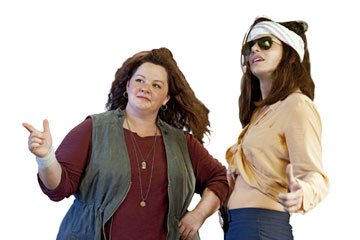
Oscar nominee Melissa McCarthy (L) and Oscar winner Sandra Bullock together in The Heat.
As a critic I am supposed to be detached, but director Paul Feig is scared for his new movie, and honestly, I am too. Like Feig's Bridesmaids, which earned an impressive $288 million in theaters (and $90 million more on DVD and Blu-ray), his newest movie, The Heat, is a comedy built around strong, smart heroines. Feig has confidence in the quality of his product, but he's worried about potential buyers. "I am very nervous about this movie," he tells me.
I understand Feig's anxiety. To emerge as a hit, the comedy must overcome the macho big-screen gauntlet of White House Down, World War Z, Man of Steel and the lingering powerhouses of Fast & Furious 6 and Iron Man 3. But I want it to do well not because I have a burning passion for its genre--Lethal Weapon--style antics involving cutely mismatched crime-solving partners--but because The Heat is the best chance my sex has this summer of tapping on Hollywood's freakishly impenetrable glass ceiling.
Feig isn't being disingenuous; The Heat is considered an underdog. Never mind that Sandra Bullock, who plays a rigid FBI agent, is an Oscar winner with one of the highest Q ratings in Hollywood or that Melissa McCarthy, who plays a ruthless Boston cop, is an Oscar nominee whose last buddy comedy, Identity Thief, made a cool $174 million. They're women. As ridiculous as it sounds, that is still an obstacle in Hollywood in 2013. Feig says The Heat tested equally well with men and women, but with two (clothed) women on its movie poster, he is right to fear the label chick flick--a term as appealing to the average male as an apartment full of cats.
Go indie and you can find a few summer films centered on girls or women, like Frances Ha, The Bling Ring and Woody Allen's Blue Jasmine, but they all fall in the limited-release category. The Heat is not one of a few major studio releases this summer to feature two female leads. It's the only one. "It's a little embarrassing," Feig says.
Not to mention troubling and infuriating. I don't need or want Katherine Heigl in a wedding dress or Rachel McAdams pluckily fighting a terrible illness. But are stories that focus on one-half of the population really so risky, so insignificant? Accepting the Crystal Award for Women in Film in early June, Laura Linney described a gender inequality that makes it rare for her to ever act on a movie set opposite another woman. "This is a problem," she said. "And it is unhealthy."
Hollywood disregards even its own past triumphs. Since Bridesmaids, the number of studio movies spotlighting a woman has remained pitiful. (Last summer, for example, all we got was Snow White and the Huntsman.) Too short a period to measure change? How about 22 years? Thelma & Louise came out in 1991 and today remains perhaps the bravest and most fully developed mainstream movie about female friendship. Susan Sarandon remembers thinking during production that this was just "a kick-ass summer in Utah." After the awards, the box office and the national dialogue, her perception was that the paradigm had shifted. "Everyone expected that there would be more movies like it," Sarandon says. "But you need scripts. And the studio system has not really gone out of its way for women. It's still a guy's domain."
